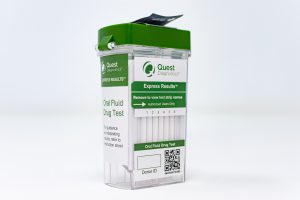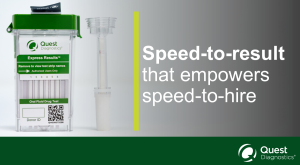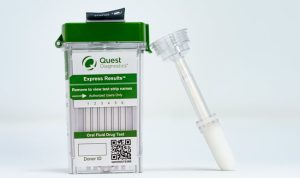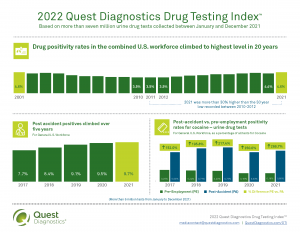When it comes to state drug testing laws, there seems to be no end to the questions employers will ask. That’s in part because no 2 state drug testing laws are exactly alike. And how those laws affect businesses can vary significantly depending on a host of factors, including in which state or states a company operates, what kind of industry the company represents, and the number of employees.
Quest Diagnostics Employer Solutions provides a host of drug testing services in all 50 states and in most US territories. Our objective is to create solutions to the challenges employers face when trying to comply with state laws. Quest offers a variety of drug testing methods, including lab-based urine, oral fluid, and hair testing, as well as point-of-collection testing devices for urine and oral fluid. Which method you use will depend on your drug-free workplace goals and how state drug testing laws factor into your program.
According to the Quest Diagnostics Drug Testing Index (DTI), in 2022, the combined US workforce urine drug positivity for all drugs persisted at 4.6%—the highest level in 2 decades. The 2021 and 2022 positivity rates were the highest since 2001, up more than 30% from an all-time low in 2010-2012.[i]
Positivity rates by industry from the DTI
The rising overall drug positivity rate for general workforce urine testing was observed widely across US industries. Over the past 5 years, the workforce positivity rate climbed in most industry sectors, led by Accommodation and Food Services increasing 42.9% (4.9% in 2018 versus 7.0% in 2022), Retail Trade increasing 42.6% (5.4% in 2018 versus 7.7% in 2022), and Finance and Insurance increasing 38.5% (2.6% in 2018 versus 3.6% in 2022).[ii]
To address the issue of more workers testing positive for drugs in the most legally defensible and compliant manner, employers must understand the complexities of the hundreds of state laws that can impact workplace drug testing. Therefore, it is wise to start with a clear understanding of 3 basic state law questions:
- Which state drug testing law applies to companies that operate in multiple states?
- Do the federal drug testing standards pre-empt state drug testing laws?
- What is the difference between “voluntary” and “mandatory” state drug testing laws?
These types of questions may be considered by some as obvious, but understanding these basics is critical to a company’s efforts to comply with all applicable state laws that can affect a drug testing program. Understanding these details is equally important to service providers such as third-party administrators, Medical Review Officers, and drug test specimen collectors who are often put in the position of helping employers make important program decisions.
If a company has operations in multiple states, which state law applies to its drug testing program?
The simple answer is all of them, but the application can be complicated. The bottom line, especially for multi-state employers, compliance with all applicable state laws is a necessity to run a strong drug-free workplace program.
Some employers make the mistake of trying to apply the law of the state where they are headquartered to their entire multi-state drug testing program. The problem with this approach is that each state’s drug testing requirements are unique to that state. For example, a company with branches located in many states is basing their entire program on California state laws. This company wants to implement random drug testing as part of their policy. Although they may be able to implement this policy in states where their branches are, like Florida and Texas, California’s laws are much different and may restrict the employer’s ability to run that program choice within that state.
Even in states without a mandatory drug testing statute like California, there may be unique legal conditions based on case law decisions or laboratory licensing regulations that a company must comply with in that state without being hampered by those legal restrictions elsewhere in the country.
Generally, a well-written drug testing policy, customized to reflect the laws of each state in which a company has operations, is recommended. Addendums to a “base” policy may be needed when some state law requirements differ from the content of that base policy. In this case an employer can add state-specific addendums to its policy or, in rare cases, have a standalone policy for each state.
Do federal drug testing regulations pre-empt state drug testing laws?
Most people understand that the US Department of Transportation (DOT) drug and alcohol testing regulations, for example, pre-empt a state’s drug testing law and other related legal requirements such as legal marijuana laws. But that only applies to employers who fall under the DOT requirement to test specific workers in safety-sensitive, transportation-related occupations. In most instances, however, it does not mean that outside of the federal mandate the same employers must still adhere to the federal regulations. For example, many DOT-covered employers drug test their non-DOT covered workers also and that portion of a company’s program does not have to be administered per the DOT regulations. Of course, an employer may choose to follow the DOT procedures with a “look-alike” program for their non-DOT employee, but they must keep the 2 programs separate.
Even when running a DOT-mandated program, state law requirements can still come into play. There are certain elements of a comprehensive drug testing program that are not covered by the federal regulations. For example, the DOT regulations do not mandate that an employee who fails a drug test be terminated, but state law may impose conditions on taking such action in the event of a first-time positive result. A state law may require or encourage employers to give such workers a second chance and outline conditions employers must follow in doing so. This is just one example among many and employers who must comply with the DOT regulations should thoroughly study any applicable state laws to ensure compliance with both types of legal requirements.
What is the difference between a voluntary and a mandatory drug testing law?
Is there such a thing as a “voluntary” law? When it comes to workplace drug testing, the answer is yes. A mandatory law applies to all companies that conduct drug testing in that state, but voluntary laws operate differently.
Several states have programs that offer special incentives to encourage employers to conduct drug testing. Participation is purely voluntary in many cases. However, if an employer qualifies to participate in a state’s program, their company must comply with the requirements of that voluntary drug testing program in order to participate.
For example there are some states that offer a discount on workers’ compensation premiums to employers who drug test in accordance with voluntary regulations provided by the state. These programs typically apply to smaller companies that are not self-insured. And the savings, depending on the state, can amount to enough to pay for all or most of a company’s drug testing costs.
Outside of a state’s voluntary program, employers are usually free to conduct drug testing as they wish, within reason and in compliance with any other applicable state laws such as workers’ or unemployment compensation regulations.
There are typically no incentives offered in exchange for compliance with mandatory laws.
Conclusion
Certainly within each state there are specific requirements that employers must be aware of when it comes to drug testing. But there are some universal rules that must be considered by both employers and drug test service providers. Although these questions may seem basic, it’s the fundamentals of drug testing employees that often get forgotten about or missed, opening the door for litigation and legitimate concerns by employees on the fairness of their company’s drug-free workplace program.
Let Quest Diagnostics Employer Solutions help you design a drug-free workplace program with state-of-the-art drug testing that complies with the state laws that apply to your company.
To learn more about drug testing, visit our website or contact us online.
[i] Post-Accident Workforce Drug Positivity for Marijuana Reached 25-Year High in 2022, Quest Diagnostics Drug Testing Index Analysis Finds. May 2023. https://newsroom.questdiagnostics.com/2023-05-18-Post-Accident-Workforce-Drug-Positivity-for-Marijuana-Reached-25-Year-High-in-2022,-Quest-Diagnostics-Drug-Testing-Index-Analysis-Finds
Wh
 Your Privacy Choices
|
Privacy Notices
|
Terms
|
Language Assistance / Non-Discrimination Notice | Asistencia de Idiomas / Aviso de no Discriminación | 語言協助 / 不䈚視通知
Your Privacy Choices
|
Privacy Notices
|
Terms
|
Language Assistance / Non-Discrimination Notice | Asistencia de Idiomas / Aviso de no Discriminación | 語言協助 / 不䈚視通知



















When it comes to state drug testing laws, there seems to be no end to the questions employers will ask. That’s in part because no 2 state drug testing laws are exactly alike. And how those laws affect businesses can vary significantly depending on a host of factors, including in which state or states a company operates, what kind of industry the company represents, and the number of employees.
Quest Diagnostics Employer Solutions provides a host of drug testing services in all 50 states and in most US territories. Our objective is to create solutions to the challenges employers face when trying to comply with state laws. Quest offers a variety of drug testing methods, including lab-based urine, oral fluid, and hair testing, as well as point-of-collection testing devices for urine and oral fluid. Which method you use will depend on your drug-free workplace goals and how state drug testing laws factor into your program.
According to the Quest Diagnostics Drug Testing Index (DTI), in 2022, the combined US workforce urine drug positivity for all drugs persisted at 4.6%—the highest level in 2 decades. The 2021 and 2022 positivity rates were the highest since 2001, up more than 30% from an all-time low in 2010-2012.[i]
Positivity rates by industry from the DTI
The rising overall drug positivity rate for general workforce urine testing was observed widely across US industries. Over the past 5 years, the workforce positivity rate climbed in most industry sectors, led by Accommodation and Food Services increasing 42.9% (4.9% in 2018 versus 7.0% in 2022), Retail Trade increasing 42.6% (5.4% in 2018 versus 7.7% in 2022), and Finance and Insurance increasing 38.5% (2.6% in 2018 versus 3.6% in 2022).[ii]
To address the issue of more workers testing positive for drugs in the most legally defensible and compliant manner, employers must understand the complexities of the hundreds of state laws that can impact workplace drug testing. Therefore, it is wise to start with a clear understanding of 3 basic state law questions:
These types of questions may be considered by some as obvious, but understanding these basics is critical to a company’s efforts to comply with all applicable state laws that can affect a drug testing program. Understanding these details is equally important to service providers such as third-party administrators, Medical Review Officers, and drug test specimen collectors who are often put in the position of helping employers make important program decisions.
If a company has operations in multiple states, which state law applies to its drug testing program?
The simple answer is all of them, but the application can be complicated. The bottom line, especially for multi-state employers, compliance with all applicable state laws is a necessity to run a strong drug-free workplace program.
Some employers make the mistake of trying to apply the law of the state where they are headquartered to their entire multi-state drug testing program. The problem with this approach is that each state’s drug testing requirements are unique to that state. For example, a company with branches located in many states is basing their entire program on California state laws. This company wants to implement random drug testing as part of their policy. Although they may be able to implement this policy in states where their branches are, like Florida and Texas, California’s laws are much different and may restrict the employer’s ability to run that program choice within that state.
Even in states without a mandatory drug testing statute like California, there may be unique legal conditions based on case law decisions or laboratory licensing regulations that a company must comply with in that state without being hampered by those legal restrictions elsewhere in the country.
Generally, a well-written drug testing policy, customized to reflect the laws of each state in which a company has operations, is recommended. Addendums to a “base” policy may be needed when some state law requirements differ from the content of that base policy. In this case an employer can add state-specific addendums to its policy or, in rare cases, have a standalone policy for each state.
Do federal drug testing regulations pre-empt state drug testing laws?
Most people understand that the US Department of Transportation (DOT) drug and alcohol testing regulations, for example, pre-empt a state’s drug testing law and other related legal requirements such as legal marijuana laws. But that only applies to employers who fall under the DOT requirement to test specific workers in safety-sensitive, transportation-related occupations. In most instances, however, it does not mean that outside of the federal mandate the same employers must still adhere to the federal regulations. For example, many DOT-covered employers drug test their non-DOT covered workers also and that portion of a company’s program does not have to be administered per the DOT regulations. Of course, an employer may choose to follow the DOT procedures with a “look-alike” program for their non-DOT employee, but they must keep the 2 programs separate.
Even when running a DOT-mandated program, state law requirements can still come into play. There are certain elements of a comprehensive drug testing program that are not covered by the federal regulations. For example, the DOT regulations do not mandate that an employee who fails a drug test be terminated, but state law may impose conditions on taking such action in the event of a first-time positive result. A state law may require or encourage employers to give such workers a second chance and outline conditions employers must follow in doing so. This is just one example among many and employers who must comply with the DOT regulations should thoroughly study any applicable state laws to ensure compliance with both types of legal requirements.
What is the difference between a voluntary and a mandatory drug testing law?
Is there such a thing as a “voluntary” law? When it comes to workplace drug testing, the answer is yes. A mandatory law applies to all companies that conduct drug testing in that state, but voluntary laws operate differently.
Several states have programs that offer special incentives to encourage employers to conduct drug testing. Participation is purely voluntary in many cases. However, if an employer qualifies to participate in a state’s program, their company must comply with the requirements of that voluntary drug testing program in order to participate.
For example there are some states that offer a discount on workers’ compensation premiums to employers who drug test in accordance with voluntary regulations provided by the state. These programs typically apply to smaller companies that are not self-insured. And the savings, depending on the state, can amount to enough to pay for all or most of a company’s drug testing costs.
Outside of a state’s voluntary program, employers are usually free to conduct drug testing as they wish, within reason and in compliance with any other applicable state laws such as workers’ or unemployment compensation regulations.
There are typically no incentives offered in exchange for compliance with mandatory laws.
Conclusion
Certainly within each state there are specific requirements that employers must be aware of when it comes to drug testing. But there are some universal rules that must be considered by both employers and drug test service providers. Although these questions may seem basic, it’s the fundamentals of drug testing employees that often get forgotten about or missed, opening the door for litigation and legitimate concerns by employees on the fairness of their company’s drug-free workplace program.
Let Quest Diagnostics Employer Solutions help you design a drug-free workplace program with state-of-the-art drug testing that complies with the state laws that apply to your company.
To learn more about drug testing, visit our website or contact us online.
[i] Post-Accident Workforce Drug Positivity for Marijuana Reached 25-Year High in 2022, Quest Diagnostics Drug Testing Index Analysis Finds. May 2023. https://newsroom.questdiagnostics.com/2023-05-18-Post-Accident-Workforce-Drug-Positivity-for-Marijuana-Reached-25-Year-High-in-2022,-Quest-Diagnostics-Drug-Testing-Index-Analysis-Finds
Wh